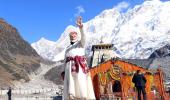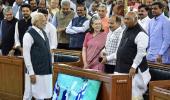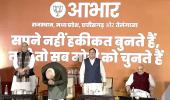'What you need is a credible Opposition, a credible platform to persuade people to believe that it can replace this government.'

If Narendra Modi returns to power in 2024...
In what way will India's politics, Indian society and the Indian economy change?
In the first of a series, where we will speak to voices across the political and social spectrum, Rediff.com's Shobha Warrier quizzes Delhi University Professor Apoorvanand.
Part one of a two-part interview:
The general belief is that Narendra Modi will return as prime minister after the 2024 general election.
How do you expect the political scene to unfold if it were to happen?
I agree that this is a widespread feeling, and the prediction is that Narendra Modi will come back.
But more than it being the reality, we are being made to believe that this is what is going to happen.
Therefore, it is useless to even think about any alternative.
It is because the powerful people who control the discourse want him to come back. That's why we have this perception being created that there is an all-pervasive feeling of Modi coming back.
This itself is a cause for concern for all of us because the element of unpredictability is what makes a democracy. But here, things are so fixed and pre-decided.
And the reasons for them are also well-known; that money is with Narendra Modi, the corporate world is with Modi, even global capital is interested in keeping him in power.
The media is with Narendra Modi, and at times we see that a neutral institution like the army also tends to align with his world view and his politics.
In short, all institutions are with Narendra Modi. So, even if there is a chance of people wanting to vote him out, these people will try all tricks to keep him in power.
That shows where our democracy has reached.
You said the media and institutions are with Modi. What will happen to them if there is going to be one more five-year term for Modi?
Being with someone is not bad, but we need to understand who that person or the party is, and what their ideology is, the institutions or the corporate world or the powerful people they are trying to identify with.
This is the party that believes in the supremacy of the Hindus, believes India is primarily the land of Hindus, and Muslims, Christians and the others have to live as second class citizens with lesser rights.
This ideology has been implemented in the last 10 years in three ways. One is by bringing in laws like CAA or the triple talaq law or freedom of religion laws which are to restrain Muslim or Christian practices.
The second is by physical violence against Christians and Muslims. The number of such attacks has increased manifold.
We see physical violence by many organisations which are mushrooming across India.
Add to it is the rampant use of hate speech against Muslims and Christians. Even the Supreme Court had to take note of the seriousness of hate speech and mob lynching. But all of them act with a sense of impunity.
We used to see non State actors attacking Muslims and Christians before. Now the state destroys them, their livelihood using bulldozers.
The State is now the main source of violence against Muslims. It keeps inventing ways to marginalise them, making them invisible or disempowered.
We heard Modi raising slogans supporting the Bajrang Dal which is implicated in cases of violence against Muslims and Christians.
The first video of this year was beating up a Muslim and forcing him to chant Jai Sriram.
It tells you where India is headed.
The third is the demonisation of Muslims through the social media, print and television.
This is going to deepen and widen in the next five years if Modi were to come back.

Do you feel unless the Congress gets stronger, it will be difficult for the INDIA alliance to stay together to take on Modi?
The fact is, you need a fulcrum in any alliance like this, and the fulcrum can only be a party that has a pan-India presence.
And that party, as things stand today, is only the Congress.
From Kerala to Arunachal Pradesh, people know the Congress. Therefore, it is very important that the Congress becomes stronger.
All the other parties in the INDIA alliance are confined to their respective regions. For example, the DMK is strong in Tamil Nadu or the JD-U and RJD are strong in Bihar.
They don't have a pan-India presence.
Voters also have this Indianness within them. They do want this Indianness to be represented by political parties.
So, if they don't find an alliance strong enough to hold Indianness, they will not go for it.
There are two alternative ideas of Indianness before us. One represented by the BJP, and the other by the Congress while the other parties are part of the INDIA alliance despite their ideological differences.
Yes, the political scene has changed dramatically after the INDIA alliance was formed.
They are in an interesting situation where they are rivals at the state level, but partners at the national level.
Now, they have to be very creative in balancing this situation as it is contradictory.
That leaves the question, whether the INDIA alliance has the creativity to hold themselves together, whether the parties will have the magnanimity to accommodate each other...
Will they realise these are not normal times? Before 2014, they could compete with each other, but now that time has passed, at least for the secular parties.
They cannot compete with each other now. For them, the time of political competition has gone.
How they resolve this is the question. For that, they have to come up with an answer.
They will also have to develop a sense of urgency. Whether these parties share the sense of urgency which the Christians and Muslims have for their survival and dignity, is the question.
They just cannot wait for a few more years and prepare for 2029. There is no time left.
The narrative we hear from the general public is, there is no one in the Opposition who can take on Narendra Modi or can be compared to him as he has become bigger than any other leader in India.
Do you think it is because Rahul Gandhi has not been able to show his leadership qualities that this is happening?
I don't blame Rahul Gandhi for the situation. This is not how democratic parties should work.
We had not imagined a situation where all institutions will work in creating an all-powerful image of Narendra Modi.
Denigrating Rahul Gandhi also...
Yes, denigrating or mocking Rahul Gandhi and other Opposition party leaders.
Before 2014, we had never imagined such a situation would arise in India.
The media used to be deferential towards to Opposition leaders, they used to listen to them and used to give a platform to them.
Even a novice like Arvind Kejriwal got fair treatment from the media.
The media was, and rightly so, generally sceptical and critical of the ruling party.
But this courtesy is not extended to Opposition party leaders now, especially to Rahul Gandhi. There is a kind of jealousy and enmity in the media and elsewhere towards Rahul Gandhi and the Congress party.
This situation is very difficult for political parties to fight. But then they have to find ways.
They have to develop their own communication strategy. Unfortunately, we have not seen that happening.

Do you see any leader in the Opposition who can stand up against Narendra Modi?
I will frame it differently. I don't think you need a face to match Narendra Modi.
What you need is a credible Opposition, a credible platform to persuade people to believe that it can replace this government.
Do people not look for a face to challenge Narendra Modi?
I know comparisons are inevitable. If you recall 2004, the BJP had a very popular face, that of Atal Bihari Vajpayee.
And the Congress or the UPA did not have a face.
We know how Sonia Gandhi was treated after the elections. Everyone was against her. She gained respectability after 2004 only.
Now, they have to think how 2004 became possible. It is something they have to go back and think about: How a very popular face like Vajpayee was defeated by a faceless Opposition.
Vajpayee was not dreaded like Narendra Modi, he was the best bet for the BJP, yet he was defeated.
This can be done again, but for that the Opposition needs to develop a sense of urgency and they need to be seen by the people as sincere.
Unfortunately, they have not been able to create that perception as yet.
- Part 2 of the Interview: 'Ram Mandir Is With 2024 Election In Mind'
Feature Presentation: Aslam Hunani/Rediff.com










